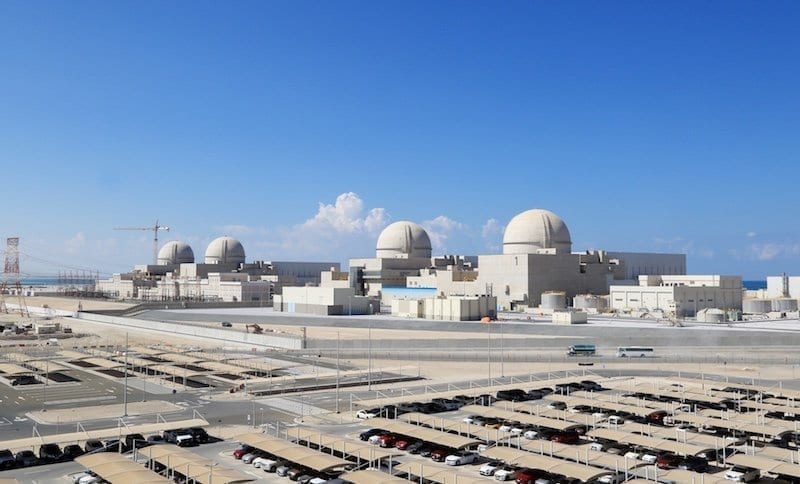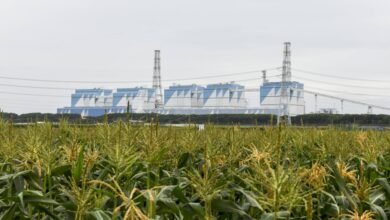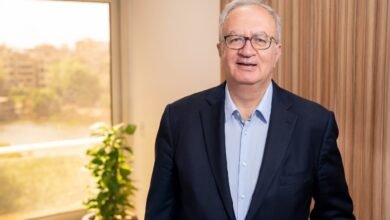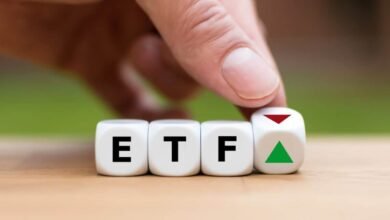UAE Considers Investment in European Nuclear Power Projects

The state-owned nuclear energy group of the United Arab Emirates (UAE) has expressed interest in supporting nuclear power projects in Europe. The news comes just weeks after the fourth unit of the emirate’s only nuclear power plant, the Barakah station (a POWER Top Plant in 2021), began delivering electricity to the grid.
The Khaleej Times, a Middle East news service, on March 29 reported that UAE officials have talked with European leaders about the prospect of the Emirates Nuclear Energy Co. (ENEC) taking a minority investment role in nuclear power assets across Europe. The news service cited three sources who it said were familiar with the discussions. It said ENEC, owned by Abu Dhabi Developmental Holding Co., known as ADQ, specifically has held talks with British officials after the possibility of investing in that country.
The UAE and Britain in December of last year signed a memorandum of understanding on civil nuclear cooperation at the United Nations COP28 climate summit in Dubai. More than 20 countries at COP28 agreed to a pledge to expand global nuclear power generation capacity by 2050.
Diversifying Energy
The UAE and its neighbor, Saudi Arabia, are among the world’s leading oil and gas producers, and both countries have said they want to diversify their oil-dependent economies with new sources of energy. British officials, for their part, have said they want additional private investment in the Sizewell C nuclear power project. Sizewell C, a project led by French energy major EDF, is being built in southeast England. British officials in November 2022 removed China General Nuclear from construction of Sizewell C, saying the UK would take a joint stake in the project alongside EDF due to strained relations with the Chinese government.

The Reuters news service quoted a spokesperson for the UK’s Dept. of Energy Security and Net Zero as saying, “Sizewell C is a crucial part of the UK’s agenda for new nuclear power, which is central to our plans for achieving a low cost, clean and secure electricity system. The commercial structure of the project is subject to ongoing development and commercially sensitive discussions.”
ENEC in a statement to Reuters said that as part of the group’s “international growth and investment plans, ENEC is working with a multitude of partners to explore collaboration opportunities in both new civil nuclear projects and civil nuclear technologies and related clean energy technologies such as clean hydrogen.” Reuters has quoted sources as saying those plans could include having ENEC as an investment partner for development of new nuclear energy projects in Europe.
Sizewell C
The Times of London last year reported that UK officials have been considering UAE investors for the Sizewell C project. The Financial Times in January of this year said Britain and EDF are “on track” to secure $25.2 billion of financing for Sizewell C by year-end 2024.
ENEC, along with Korea Electric Power Corp. (KEPCO), led construction of the Barakah Nuclear Energy Plant, a four-reactor facility that at full commercial operation will have 5,600 MW of generation capacity. The plant features four KEPCO-built APR-1400 reactors. The first of the four units came online in 2021, with subsequent units following over the past three years.
Mohamed Al Hammadi, managing director and CEO of ENEC, in a news release said, “The start-up of the fourth unit of the Barakah Nuclear Energy Plant is a significant achievement as we now enter into a new era to deliver the full promise of the Barakah Plant. In the past five years, the UAE has added more clean electricity per capita than any other nation globally, with 75% coming solely from the Barakah Plant, demonstrating how pivotal nuclear energy is in decarbonizing the country’s power sector.”
Nuclear power is being considered by more European countries as a way to help meet net-zero carbon goals, and to provide an alternative to power generation from Russia-sourced natural gas after Russia’s invasion of Ukraine.
—Darrell Proctor is a senior associate editor for POWER (@POWERmagazine).




